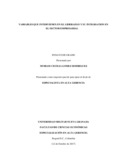Variables que intervienen en el liderazgo y su integración en el sector empresarial
Variables that intervene in leadership and its integration in the enterprise sector
Citación
Fecha
2017-10-22Autor
Gómez Rodríguez, Myriam Cecilia
Título obtenido
Especialista en Alta Gerencia
Especialista en Alta Gerencia
Publicador
Universidad Militar Nueva Granada
Palabras claves
; liderazgo; administracion de empresas; etica profesional
Metadatos
Mostrar el registro completo del ítem
Documentos PDF
Resumen
La evolución y desarrollo que presentan las organizaciones llevan a concebir el liderazgo de una manera distinta a la tradicional, en ese contexto se observa que el liderazgo ha atravesado por cambios de pensamiento y comportamiento que van surgiendo de la necesidad social e institucional que la época demande, los modelos de liderazgo ortodoxos aplicados antes de los 80´ presentaban características que suprimían, imponían, coartaban y se fundamentaban en el modelo “transaccional” bajo el principio “premio – castigo”, los líderes creían manejar una verdad absoluta y rechazaban todo punto de vista que fuera en contra de sus postulados.
En la actualidad, aunque algunos de estos comportamientos han sido heredados, también han surgido nuevos modelos que se fundamentan en crear identidad, sentido de propósito, cohesión y el desarrollo de habilidades blandas que conlleven al bienestar y reconocimiento de los individuos, logrando así mejorar la productividad organizacional y los resultados en diferentes grupos sociales.
Es objeto de este ensayo, determinar el aporte derivado de la práctica del liderazgo transformacional, que se fundamenta desde la base ética y la autenticidad del SER, aspectos que deben cohabitar en los nuevos líderes, brindando visión, carisma, transformación, flexibilidad y democracia, que a través del trabajo colectivo invita a los miembros del grupo a poner lo mejor de sí para alcanzar los resultados.
The evolution and development that the organizations present lead to the conception of leadership in a different way to the traditional one, in that context it is observed that the leadership has undergone changes of thought and behavior that arise from the social and institutional necessity that the time demands , the orthodox leadership models applied before the 1980s presented characteristics that suppressed, imposed, restrained and based on the "transactional" model under the "reward - punishment" principle, the leaders believed to handle an absolute truth and rejected all points of a view that was against their postulates.
Today, although some of these behaviors have been inherited, new models have also emerged that are based on creating identity, a sense of purpose, cohesion and the development of soft skills that lead to the well-being and recognition of individuals, thus improving the organizational productivity and outcomes in different social groups.
It is the object of this essay to determine the contribution derived from the practice of transformational leadership based on the ethical basis and authenticity of the SER, aspects that must cohabit in the new leaders, providing vision, charisma, transformation, flexibility and democracy, which through collective work invites the members of the group to put their best efforts to achieve the res
Key words:
Colecciones
- Alta Gerencia [1084]


